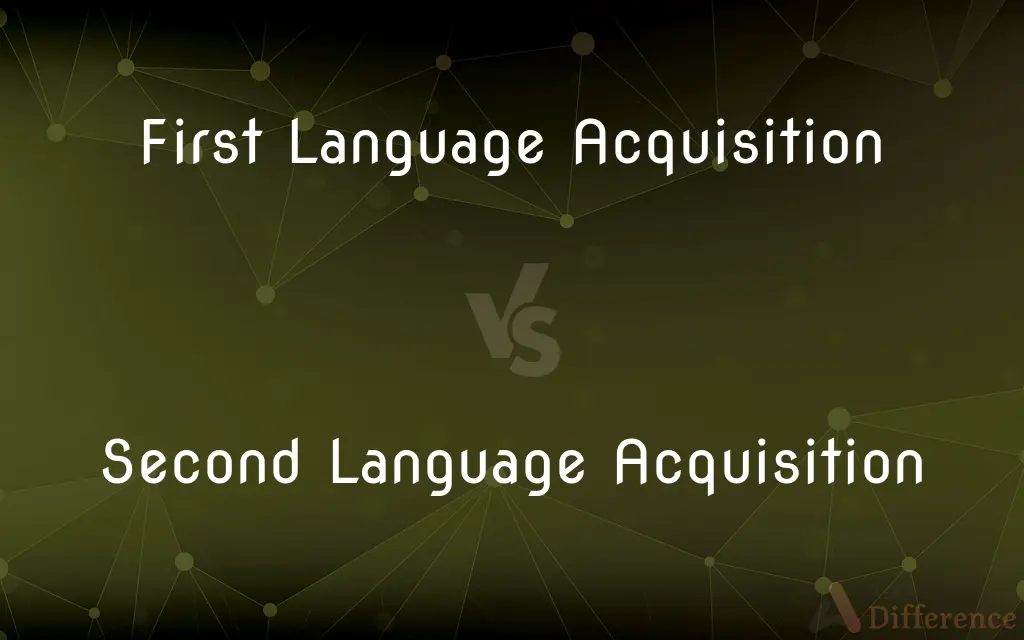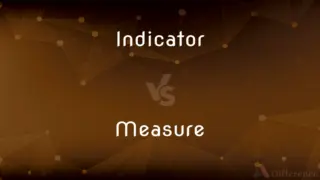First Language Acquisition vs. Second Language Acquisition — What's the Difference?
Edited by Tayyaba Rehman — By Fiza Rafique — Published on December 17, 2023
First Language Acquisition refers to the natural process of children learning their native tongue, while Second Language Acquisition is the learning of another language after the first is established.

Difference Between First Language Acquisition and Second Language Acquisition
Table of Contents
ADVERTISEMENT
Key Differences
First Language Acquisition (FLA) describes the seemingly innate process children undergo when picking up their mother tongue. In contrast, Second Language Acquisition (SLA) refers to the process of learning any subsequent languages after the mother tongue.
FLA typically begins from birth, and by the age of five, most children are proficient in their native language's basic structure. SLA, however, can start at any age after the first language is established and might require more explicit instruction.
The context in which First Language Acquisition happens is usually informal and instinctual, with children absorbing linguistic structures through daily interactions. Second Language Acquisition often occurs in more structured environments, such as classrooms or through dedicated learning programs.
First Language Acquisition tends to result in native-like fluency without conscious effort. Conversely, achieving native-like fluency in Second Language Acquisition often demands significant effort and might not always be attainable, depending on various factors, including age.
Both FLA and SLA are crucial areas of study in linguistics. First Language Acquisition offers insights into the human brain's natural linguistic capabilities. In contrast, Second Language Acquisition provides understanding into cognitive processes and learning strategies in acquiring new languages.
ADVERTISEMENT
Comparison Chart
Age of Initiation
From birth to early childhood.
Any age after the first language is well established.
Setting
Informal, daily interactions.
Often structured (e.g., classrooms, online courses).
Effort & Conscious Learning
Effortless and unconscious.
Often requires conscious effort and study.
Fluency Outcome
Typically results in native-like fluency.
Native-like fluency varies and may require more effort.
Study Significance
Insights into innate linguistic capabilities of the human brain.
Understands cognitive processes in learning new languages.
Compare with Definitions
First Language Acquisition
The initial linguistic system a person learns.
Despite moving countries, his First Language Acquisition remained rooted in his birthplace.
Second Language Acquisition
Gaining proficiency in a non-primary language.
Her Second Language Acquisition was impressive, as she became fluent in French in just two years.
First Language Acquisition
The natural way children attain proficiency in their mother tongue.
Her First Language Acquisition was influenced by both her American mom and Spanish dad.
Second Language Acquisition
The pursuit of linguistic skills beyond the mother tongue.
Online apps have made Second Language Acquisition more accessible for many.
First Language Acquisition
The instinctual process of children learning their native language.
Babies begin their First Language Acquisition from the moment they're born.
Second Language Acquisition
Studying and mastering a language after the first.
He moved to Italy for his Second Language Acquisition of Italian.
First Language Acquisition
Learning language without formal instruction.
Children's First Language Acquisition is a testament to the brain's remarkable adaptability.
Second Language Acquisition
The process of learning a language besides one's native tongue.
Many students begin their Second Language Acquisition in middle school.
First Language Acquisition
The unconscious assimilation of a language from birth.
Through First Language Acquisition, toddlers rapidly expand their vocabulary.
Second Language Acquisition
Achieving fluency in an additional language.
Despite challenges, his determination in Second Language Acquisition was commendable.
Common Curiosities
Can adults undergo Second Language Acquisition successfully?
Yes, while challenges exist, many adults achieve fluency in a second language with effort.
What is First Language Acquisition?
It's the natural process where children learn their native language without formal teaching.
When does First Language Acquisition typically start?
It starts from birth, with children gaining significant proficiency by age five.
Is classroom instruction essential for Second Language Acquisition?
While helpful, many achieve proficiency through immersion, online resources, or self-study.
Does First Language Acquisition ever stop?
Basic acquisition typically concludes by adolescence, but vocabulary and refinement continue throughout life.
What's meant by Second Language Acquisition?
It refers to the learning of any language beyond one's first or native language.
Is First Language Acquisition faster than Second Language Acquisition?
Typically, yes. Children naturally and rapidly acquire their first language, while the second often requires more effort.
Do all humans have the capability for First Language Acquisition?
Yes, barring cognitive or hearing impairments, it's an innate human ability.
How does age affect Second Language Acquisition?
Younger learners often find pronunciation and intuitive grasp easier, but adults can achieve fluency with dedication.
Why study First Language Acquisition?
It offers insights into natural linguistic abilities and brain development.
Are there common strategies for successful Second Language Acquisition?
Yes, including immersion, consistent practice, and using real-world language contexts.
Why is Second Language Acquisition challenging for some?
Factors include age, motivation, exposure, and the specific languages involved.
What aids Second Language Acquisition?
Consistent exposure, practice, motivation, and real-world application aid the process.
Are there specific stages to First Language Acquisition?
Yes, including babbling, one-word utterances, and then more complex sentences.
Can someone have more than one "first language"?
Yes, simultaneous bilinguals acquire two languages naturally from birth.
Share Your Discovery

Previous Comparison
Biofuel vs. Fossil Fuel
Next Comparison
Indicator vs. MeasureAuthor Spotlight
Written by
Fiza RafiqueFiza Rafique is a skilled content writer at AskDifference.com, where she meticulously refines and enhances written pieces. Drawing from her vast editorial expertise, Fiza ensures clarity, accuracy, and precision in every article. Passionate about language, she continually seeks to elevate the quality of content for readers worldwide.
Edited by
Tayyaba RehmanTayyaba Rehman is a distinguished writer, currently serving as a primary contributor to askdifference.com. As a researcher in semantics and etymology, Tayyaba's passion for the complexity of languages and their distinctions has found a perfect home on the platform. Tayyaba delves into the intricacies of language, distinguishing between commonly confused words and phrases, thereby providing clarity for readers worldwide.
















































